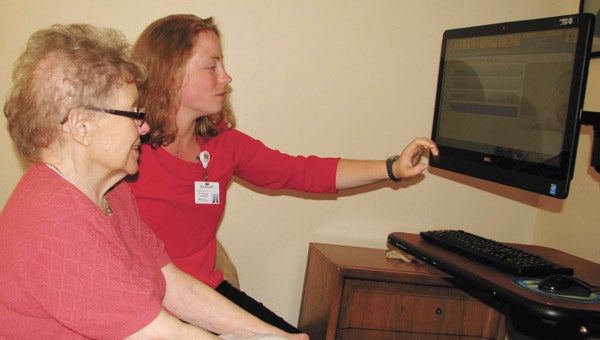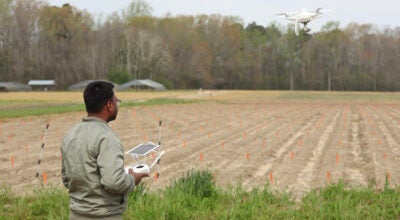Birdsongs fund dementia study
Published 8:49 pm Friday, March 25, 2016

Katelin Garvin, a therapeutic recreation specialist at the Hoy Nursing Care Center at Westminster-Canterbury on Chesapeake Bay in Virginia Beach, helps resident Pirkko Fanelli use the iN2L system.
Pirkko Fanelli sways to the music as Concerto No. 9 in B flat major emanates from a large touchscreen in her room.
“I like music best of all,” Fanelli says, softly clapping.
At the end of the song, Katelin Garvin, a therapeutic recreation specialist, redirects Fanelli’s attention to a word game on the touchscreen. Garvin leads Fanelli through a series of common phrases (“All that glitters is not __”) and asks Fanelli to fill in the blank.
Fanelli is a resident at the Hoy Nursing Care Center at Westminster-Canterbury on Chesapeake Bay in Virginia Beach, and she was recently a participant in a research study funded by Suffolk’s George and Sue Birdsong.
The study found dramatic results associated with the use of bedside touchscreen computers loaded with software developed by Colorado-based It’s Never 2 Late and referred to as iN2L.
“It’s been the most rewarding thing, because every day I hear something that’s a plus about it,” said Sue Birdsong, who is on the Westminster-Canterbury Foundation Board. “I haven’t heard a negative thing about it.”
The study measured the effects of using the technology on 62 Westminster-Canterbury residents with varying levels of dementia. Conducted from June to December last year, the study found that six of seven residents who were on continuous antipsychotic medications decreased their use to varying degrees. Four in 10 had a clinically significant reduction in use of the drugs.
Dr. Scott Sautter of Hampton Roads Neuropsychology said people with dementia are often upset and confused because they misperceive their circumstances. Antipsychotic drugs are often used as a “chemical restraint.”
“That’s unfortunately a very common circumstance,” he said.
But the iN2L technology now has been shown to reduce the use of those drugs.
The large touchscreens are easy to use, and the software includes a wide range of activities. Users can play solitaire or match games, solve puzzles, watch travel videos or old television programs, listen to music or sermons or TED talks, view maps or a soothing aquarium scene, or Skype with loved ones.
“They’re actually making connections,” said Sautter, who’s also an associate professor with Eastern Virginia Medical School, which participated with the study. “Even with people with significant dementia, you can unlock different memories that they have of different types of events.”
The study discovered other benefits besides just decreased use of antipsychotic medications. Behavioral episodes became less frequent for more than half of the participants. Depression decreased for 41 percent of participants. Cognitive scores rose for nearly a quarter of the participants, while staff caregivers indicated a 47-percent drop in stress.
What’s more, the study participants enjoyed the technology so much that they used it for nearly 31 hours a week on their own, even when a Virginia Wesleyan College student volunteer was not with them.
Westminster-Canterbury President and Chief Executive Officer J. Benjamin Unkle Jr. hopes the decrease in caregiver stress and the independent use will be selling points in getting the technology widely adopted.
“It’s hard when you’re at the bleeding edge of technology,” he said. New technology often is not deployed unless there’s a financial return on investment, he noted.
“I thought we would be able to eventually find a payoff,” he said. “If we can establish it’s the right thing to do and it pays for itself, now we’re off to the races.”
Unkle believes the study has laid the groundwork for closer exploration of the technology.
“I don’t think it’s going to have the dramatic staffing impact that a lot of people feared,” he said. “No one has asked for more staffing. No service provider can afford one-on-one, customized engagement in every room, but with a computer that’s possible.”
After Unkle saw the results of the study, he said he felt a “moral obligation” to put the computers back in the rooms of the residents so they could continue using them.
“What else could you do for someone at that stage of life that’s giving them something meaningful to do with their hours?” he asked. “We can’t cure their diseases with this engagement technology, but we can make life a lot better for a lot more hours of their day.”
“I’ve just seen so many different ways it can be utilized,” said Laura Mock, therapeutic recreation coordinator at Westminster-Canterbury. She recalled one resident who was mostly nonverbal, or nonsensical when she did speak, said “fish” and “blue” when she saw the aquarium scene. “It’s such a tool to connect.”
Health care providers who weren’t involved in the study also see great promise.
“Music and memory and reminiscence and stimulation are able to be provided for those patients to give them peace and quality of life, non-pharmacologically,” said G. Richard Jackson, executive director of the Riverside Center for Excellence and Aging. “I can’t even describe how important that is.”
Jackson noted that 10,000 Americans turn 65 every day, and many of them will go on to have some form of dementia.
“A lot of those folks are going to be in a secure memory unit because they are significantly impaired,” said Jackson, who was invited to a recent presentation of the study results. “Many of those individuals who will end up in a long-term care facility sometimes are agitated and they’re depressed and they’re easily provoked and they don’t want to accept nursing care.”
George Birdsong, who agreed to fund the study after his wife told him about it, said the early results do look favorable.
“It really could be what I call a game-changer for the industry,” he said. “It could be something lots of other health organizations that work with people that may need some help in the dementia area would find helpful.”
The Birdsongs donated $228,000 to fund the study.
Sautter said the study is going to be repeated with Westminster-Canterbury assisted living residents as soon as Eastern Virginia Medical School’s internal review board approves it.






